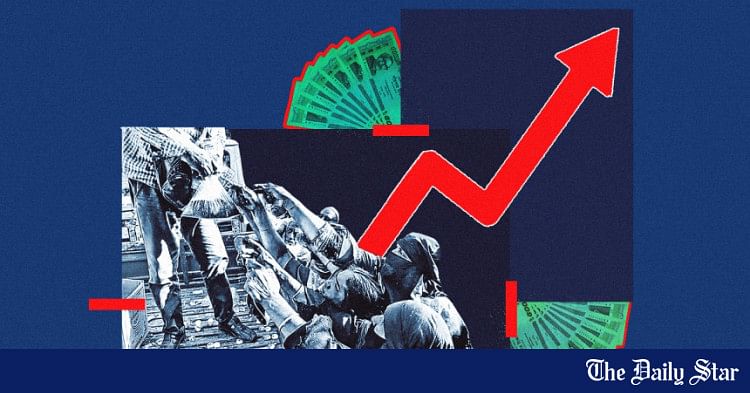FILE VISUAL: SHEIKH SULTANA JAHAN BADHON
“>
FILE VISUAL: SHEIKH SULTANA JAHAN BADHON
Spiralling prices not only dampen economic growth but also have deleterious effects on the consumption of low-income households. As prices increase, they must spend a larger proportion of their income and even cut down spending on day-to-day necessities. Persistent inflation can push more people into poverty and make those who are already poor even more vulnerable.
More than 18 percent of Bangladesh’s population is below the national poverty line. According to the global rate for lower-middle-income countries, around 30 percent can be classified as poor. Many can find themselves crossing into poverty given a single shock. Inflation is such a shock, forcing poor people to cut their expenditures, including on food, health, and education.
Bangladesh has experienced high inflation since 2022. After hovering around 5.5 percent between 2016 and 2021, the inflation rate started rising sharply due to global supply shocks exacerbated by the conflict in Ukraine and the surge in demand following the winding down of the COVID-related public health measures.
Bangladesh was not alone in seeing a price upsurge in 2022. Inflation spiked globally in both developed and developing countries. In developing countries, it rose from 7.2 percent (2021) to 9.8 percent (2022), while in high-income countries, inflation doubled from 3.1 percent to 6.2 percent. While many countries were able to reverse this trend quickly, the upward pressure on prices continued in Bangladesh, peaking at 10.8 percent in December 2024.
The good news is that, lately, price hikes are slowing down. The inflation rate in February 2025 was 9.3 percent, lower than the December 2024 peak but still quite high. The battle, therefore, needs to continue and should be fought on multiple fronts to avoid a resurgence of double-digit inflation.
A multi-pronged response that addresses supply constraints alongside monetary and fiscal policy adjustments is needed to tame persistent inflation. Relying too much on monetary contraction will not suffice to combat escalating prices, driven partly by supply-related issues such as import tariffs, poor logistics, and market distortion. Several related factors can feed inflation. An increase in input costs can lead to higher prices of finished goods and services. Similarly, if the supply is constrained, prices tend to go up. Moreover, if an economy is growing fast, the so-called overheating can act as a pull factor for prices. A weaker national currency can also feed inflation, especially when the country relies a lot on imports. Uncompetitive markets and poor logistics also can drive up prices.
To reduce the money supply, the Bangladesh Bank applied monetary brakes more aggressively between October and December 2024 with a 1.5 percent increase in the policy rate. Before that, the policy rate was below the inflation rate. However, a restrictive monetary policy can discourage borrowing and investments. The business community in Bangladesh has already raised concerns about high interest rates.
There is also the question of the transmission effect of money supply, which can, among others, depend on the size and depth of the financial sector. In many developing countries, the relationship between interest rates and inflation is less conspicuous. Besides supply-side inflation, a large informal economy, and a relatively smaller financial sector can limit the transmission of monetary policy.
As a recent UNDP paper on inflation shows, an expansionary monetary policy has played a part in driving inflation in Bangladesh, but there is evidence that supply-side problems are also at play. The present episode of high inflation is a result of a confluence of factors.
Monetary contraction can be a powerful signal for managing future expectations and ensuring that inflation does not get anchored. However, an extended period of monetary tightening can slow down the economy. This must be avoided, especially when the GDP growth of Bangladesh is losing momentum. While maintaining a degree of monetary tightening and fiscal prudence, addressing deeper structural problems that tend to stroke inflation in Bangladesh must be addressed.
Moving forward, a whole-of-government response is needed to curb inflationary pressure. Better price monitoring, coordination among various institutions for synchronising and better sequencing of import tariff policies and strengthening the competition commission are actions that can be rolled out in the near term. Other measures such as improving the regulatory environment, streamlining compliance, and reducing bureaucratic inefficiencies will also reduce business costs and help stabilise prices.
Lastly, it is important to recognise that all these measures will take time to show results. It is, therefore, critical that existing social protection measures are further broadened to prevent more people from falling below the poverty line. Increasing cash transfers to the most vulnerable populations can be a quick and effective way of helping them cope with abnormal price hikes. Such transfers not only help avoid reversals in poverty reduction but are also investments for building economic resilience.
Stefan Liller is resident representative at United Nations Development Programme (UNDP) Bangladesh.
Owais Parray is country economic adviser at UNDP Bangladesh.
Views expressed in this article are the author’s own.
Follow The Daily Star Opinion on Facebook for the latest opinions, commentaries and analyses by experts and professionals. To contribute your article or letter to The Daily Star Opinion, see our guidelines for submission.



